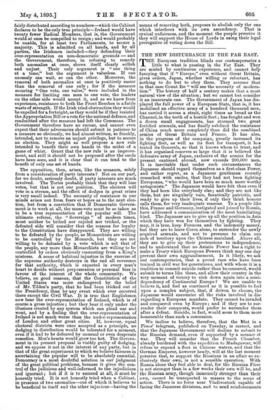THE NEW DISTURBANCE IN THE FAR EAST. T HE European tradition
blinds our contemporaries a little to what is passing in the Far East. They are misled by continuous experience, and cannot help fancying that if "Europe," even without Great Britain, gives orders, Japan, whether willing or reluctant, has nothing to do but to obey them. They assume that in that case Count Ito "will see the necessity of modera- tion." The history of half a century makes that a most natural view of the situation ; but we cannot but consider it an inaccurate one. The Government of Japan has dis- played the full power of a European State, that is, it has mobilised an effective army of a hundred thousand men, has carried it across a strait, eight times as broad as the Channel, in the teeth of a hostile fleet ; has fought and won a dozen small engagements, has stormed two great fortified arsenals, and has finally subdued the resistance of China much more completely than did the combined armies of Great Britain and France. It has also, in the progress of the campaign, greatly increased its fighting fleet, as well as its fleet for transport, it hca tested its Generals, so that it knows whom to trust, and it has organised reserves so large that it is believed the defensive army of Japan, exclusive of the armies for the present cantoned abroad, now exceeds 200,000 men. It is inevitable that under such circumstances the Japanese should regard themselves as a first-class Power, and rather regret, as a Japanese gentleman recently remarked with smiles, that they had not been fighting Europeans, "who would have been so much more worthy antagonists." The Japanese would. have felt thus even if they had been like everybody else; and they are not Eke them, but are singularly vain, fanatically patriotic, and ready to give up their lives, if only they think honour calls them, for very inadequate reasons. To a people like this, France and Germany, instigated and joined by Russia, have addressed a communication of the most humiliating kind. The Japanese are to give up all the position in Asia which they have won for themselves by fighting. They may, it is true, keep Formosa and the indemnity money, but they are to leave Corea alone, to surrender the newly acquired arsenals, and not to presume to claim one inch of territory upon the Chinese mainland. Above all, they are to give up their pretensions to independence, and to understand that no Asiatic Power has a right to make a Treaty which European Powers think may one day prevent their own aggrandisement. Is it likely, we ask our contemporaries, that a proud race who have been trained in civil war for generations, and with whom it is a tradition to commit suicide rather than be censured, would submit to terms like these, and allow their country in the very moment of victory to sink down again into a semi- dependency of Continental Europe ? We are unable to believe it, and feel as convinced as it is possible to feel upon a complex subject, that, if driven to choose, the Japanese would encounter all the risks involved in dis- regarding a European mandate. They cannot be invaded and conquered even by Europe ; and if they are to sur- render their conquests, would prefer to surrender them after a defeat. Suicide, in fact, would seem to them more honourable than such a concession.
We incline to believe, therefore, that the hint in a Times' telegram, published on Tuesday, is correct, and that the Japanese Government will decline to submit to the Russian demand, even if supported by a menace of war. They will consider that the French Chamber, already burdened with the expedition to Madagascar, will refuse to expend a fleet in Chinese waters, and that the German Emperor, however heady, will at the last moment perceive that, to support the Russians in an affair so ex- clusively their own, is not a sensible operation. With Russia alone they feel able to deal, for the Russian Fleet is not stronger than in a. few weeks their own will be, and the Russian army, though immensely stronger than their own, cannot be transported in masses to the scene of action. There is no force near Vladivostock capable of facing the Japanese divisions, and to send reinforcements by land from Western Russia, involves a march of two thousand five hundred miles over a nearly unprovided country, by troops who have more than any troops in the world the habit of perishing en. route. Such a war would severely tax the Russian Treasury, never too well supplied ; and while victory would only restore the old status quo, defeat would rouse all the tribes of Northern Asia to make one more struggle for independence of the secular foe, who, be it remem- bered, has not succeeded in assimilating or even taxing them. The Japanese know these circumstances much better than we do, for they debated the whole of them in the Grand Council, just before the war with China, and as we conceive their temper, they have decided to go forward and ratify the Treaty in spite of any protest that Russia may resolve to make. Nor is it probable that China will refuse the ratification. Russia could not move in time to prevent a descent upon Pekin, and to the Man- chous it may well appear that the Japanese are hardly such formidable masters as the Russians would prove. They are, at least, Mongols ; and though they have adopted the ways and assimilated the science of the detested West, they have not adopted its creed. Japan, moreover, proffers alli- ance, while the very object of Russia is to take away a great slice of Chinese Manchuria and Corea, without which her Siberian railway cannot by physical possibility be extended to Port Lazareff.
We should expect, therefore, war between Russia and Japan but for two reasons. One is that the group of great Russians who advise though they cannot control the throne, are accustomed to work very patiently, and will represent to the Czar that if he postpones action for five years, he will be much more sure of victory. The fleet can be considerably strengthened in that time, and the great railway can be sufficiently finished for the transport of troops. Why, then, place everything at hazard on the issue of a doubtful naval engagement ? Very little will be altered in the situation by land within five years, and the railway once finished, Russia will by land, as compared with Japan, be almost irresistibly strong. There will be plenty of opportunities for quarrel in 1901; and if the diplomatic protests are firmly made, Japan may possibly make some concession sufficient for the present to save Russia's dignity. These views are quite likely to prevail at St. Petersburg, and they may also have their effect at Tokio. Strongly moved as they are, the Japanese are a people with power to wait, as they have shown by their secret prepara- tions for war with China, continued for twenty years, and though they would face a Russian war if com- pelled, they would not be sorry if it were postponed to 1901. By that time their Navy will be doubled, their treasury will be again full, they will either have riveted their grasp on China, or have ceased to expend strength on that undertaking, and they may have acquired, though it is improbable, an active European ally. They will at all events have broken up the concert, which, though they are separated, by permanent interests and incurable dislikes of race, may for a moment bind together the Continental Powers, and induce them to run the risks of declaring a blockade of Japan. If therefore a compromise is possible which involves no loss, the Japanese may agree to it ; and such a compromise is said to have been suggested in St. Petersburg. If Japan would agree to retain the Liau-tung Peninsula for a term of years, say, fourteen, instead of annexing it, then it is said Russian wrath might be appeased, and Russian dignity satisfied. The proposal will be most distasteful to the Japanese Government, which has far-reaching ideas ; but still it gives them time, as it also gives Russia; and it may by possibility be accepted. We do not think it will be, because the Japanese show no sign or wavering, but it may be ; and if it is, there will be calm in the East once more, till the century has expired. Otherwise, there will be one of the strangest wars on record,—a struggle between the huge Northern Empire and a highly organised island- Power, which it cannot reach.
We do not see why in any event Great Britain should be drawn into the conflict. If the time-bargain is made, it will snit us very well, our interest being to postpone all struggles, and if war should arrive, we could look on, not sympathising greatly with either Power. The secret Treaty with Japan, of which excited Russians accuse us, does not exist, nor should we defend Japan against any civilised attack. There might be trouble, no douht, if a blockade were attempted, for there always is ; but in that event England and the United States would almost of necessity be in agreement, and the Power which would disregard a reasonable representation from the whole Anglo-Saxon race, upon a question of mari- time law, has yet, we fancy, to be born. We can afford to wait very well ; and if Frenchmen and Russians find pleasure in denouncing us as "greedy shopkeepers" and "traitors to the European cause," and "perfidious beyond example," why, we were subjected to precisely the same abuse in the beginning of the century, and after all, 1815 came round. No Russian Prince or Baron can swear at us more energetically than Napoleon's writers swore, and swearing is only breath with a garlicky flavour.







































 Previous page
Previous page